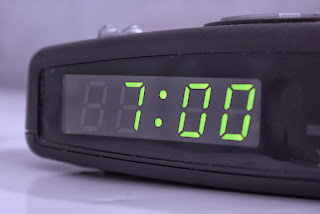You snooze, you lose
I’m a snooze-aholic. I’m the person who purposely sets her alarm clock nine or eighteen minutes before I really need to get up so that I can have the pleasure of smacking that button on the top of my clock with the force of a freight train coming down a mountain before rolling back over and snuggling into the warm blankets.
Somehow, in my weary mind, I feel that I am tricking my body into thinking that I’m doing something really nice for it. It’s the equivalent of knowing that you’re going to eat an entire pie, but you just serve yourself one sliver at a time, purposely allowing yourself the treat and the lack of self-restraint.
Because when it comes to pie and sleep, I have little self-restraint.
Which is why I’m so deeply in love with my snooze button.
And which is also why, I know now, that I stumble around for the first fifteen minutes of my day, walking in circles and doing things I have no recollection of because my body does not like the snooze button as much as my mind does. There will be days when I have to stop and think and try to remember if I ate breakfast because I literally don’t remember what I did when I first woke up. Sometimes I even have to look at the bread bin to see if there is a missing bagel. How I manage to make a pot of coffee in this state of mind every day without burning down the house is itself a miracle.
Turns out that snoozy habit of mine is doing more harm than good.
In a perfect world, or on the weekends when there are no soccer games or theater rehearsals, our bodies have little internal clocks that tell us to wake up. They get all primed and ready about an hour before our eyes pop open and little chemicals are released that wakes us up happy, ready to start the day, and able to remember if we consumed toast.
But the world is not perfect, and there are lunches to be packed and jobs to be done and so we rely on these mechanical devices to rouse us out of our sleep, no matter if our body is ready or not. When we hit the snooze button, though, there’s a chance our bodies will reset and fall back into the deepest of sleeps so that nine minutes later when it goes back off you find yourself slapping your nightstand and then standing in your bathroom wondering how you got there.
As always, the Internet provides countless tips on how to break the snooze addiction. Some of them are really genius, as if some fancy scientist worked very hard to come up with them. These suggestions are: go to bed earlier, put your alarm clock out of your reach, and disable your snooze button by super gluing it so that it is impossible to use. Other more creative ideas are: buy a coffee pot with a timer, set your thermostat to heat your room an hour before waking so that your body will release those wake-up chemicals, or get a really loud alarm that will scare you so senseless that even if you push the snooze, your beating heart will keep you wide awake. My favorite suggestion however, is to “reward your brain with being awake with an enjoyable mental activity such as reading a book, playing a game, or playing a musical instrument.”
I’m going with the last one.
So if at 6:00 AM one morning you hear the faint sounds of a saxophone coming from my house, do not panic. I’m simply trying to remember if I enjoyed that bagel or not.
Endnote: Ever wonder why snooze alarms are only nine minutes? It’s a feature of the digital age. The clock only has to concentrate on the minute hand. Ain’t got time for more math, I guess.



Comments